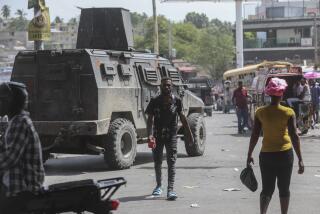10 U.N. Guards Take Up Posts in North Iraq : Kurds: The men, armed only with handcuffs, are the vanguard of up to 500 who will help provide security in the region.
- Share via
DAHUK, Iraq — Ten blue-uniformed U.N. guards, armed only with handcuffs, arrived Sunday in this northern city to begin their mission to provide security in northern Iraq.
The guards were sent to reassure tens of thousands of Kurds who fled the city after the crushing of their short-lived uprising in March.
“They will be very visible,” Staffan de Mistura, the chief U.N. representative for northern Iraq, said of the guards. “They are 10, but they will appear to be 100.”
The 10 guards are the first of a contingent of up to 500 who will work to provide security in northern and southern Iraq under a tentative agreement with Baghdad.
The U.N. guards were not the only newcomers in town Sunday. A group of Iraqi Kurdish guerrillas brandishing AK-47 rifles strolled through the provincial capital, advising passersby of their return.
De Mistura conceded that the unarmed U.N. guards can do little about the guerrillas.
“We are not here to disarm people--just to reassure all those involved in the humanitarian operation,” he said.
But the guerrillas’ leader, Hussain Sinjari, said his group is planning to peacefully move back into the city. “I came here to make people come back and help the international effort--not for any fighting,” he said.
De Mistura said the U.N. guards will not carry firearms, although the agreement reached with Baghdad allows them to do so.
“I think the best arm is the U.N. flag,” he said.
The 10 guards, clad in light-blue shirts and dark-blue trousers, arrived in a convoy of five white U.N. jeeps. They were greeted with waves and smiles by people in this nearly deserted city.
The guards, who usually protect the U.N. building in Geneva, come from Switzerland, France, Portugal, Algeria, Mauritius and Pakistan. Their backgrounds range from police work to being a Swiss Guard at the Vatican.
The U.N. forces arrived after most Iraqi soldiers had pulled out from the Dahuk area under an agreement between Iraqi and coalition forces Saturday.
The U.S.-led coalition and the United Nations are hoping to persuade refugees to return to Dahuk and the surrounding area, home to about 250,000 people before the Persian Gulf War.
Most residents have refused to come home from camps on the Turkish border or in northern Iraq because Dahuk has not been added to the security zone protected by American, British, French and Dutch forces.
More to Read
Sign up for Essential California
The most important California stories and recommendations in your inbox every morning.
You may occasionally receive promotional content from the Los Angeles Times.













